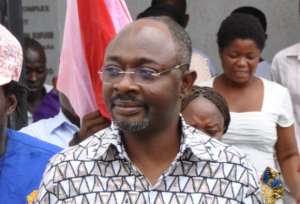
Chief Justice Anin Yeboah has advised businessman, Alfred Woyome, to cough up money to settle his GHS47 million debt to avoid the sale of his properties.
Justice Yeboah made the comment during the hearing of an application by the Attorney General seeking clearance from the court for the State to take over Mr. Woyome’s properties instead of selling them.
The application by the AG follows a request by the National Security for the transfer to the State some properties belonging Alfred Woyome which were ordered by the court to be sold to offset his debt to the state.
In a letter signed by the National Security Minister, Albert Kan Dapaah and addressed to the Attorney General, the National Security Ministry explained that the decision is a result of the difficulty the auctioneer was facing in selling the properties.
The properties include two mansions at Trassaco Estate, a house at Kpehe where he resides, an office complex of Anator Holdings, a residential building at Abelemkpe and a stone quarry in the Eastern Region including its plants and equipment.
The case was adjourned to 24th of June due to the unavailability of the lawyer of Alfred Woyome.
In July 2014, the Supreme Court ordered Mr. Woyome to refund GHS51.2 million to the state on the basis that the manner in which he obtained the money was unconstitutional.
The payment concerning contracts between the state and Waterville Holdings limited in the construction of stadia for the 2008 African Cup of Nations held in Ghana.
The Supreme Court gave the Attorney General permission to sell properties belonging to Mr. Woyome to offset part of the GHS47 million he owes the state.
Following delays in retrieving the money, the Supreme Court judges unanimously granted the Attorney-General clearance to execute the court's judgment ordering Mr. Woyome to refund the cash to the state.
The ruling followed claims made by the Receivers of defunct UT Bank that some of the properties identified by the State for sale were theirs.
According to the lawyers of the defunct UT Bank, Mr. Woyome used the said properties as collateral for loans at the bank which he failed to pay back.
---citinewsroom




 Lay KPMG audit report on SML-GRA contract before Parliament – Isaac Adongo tells...
Lay KPMG audit report on SML-GRA contract before Parliament – Isaac Adongo tells...
 Supervisor remanded for stabbing businessman with broken bottle and screwdriver
Supervisor remanded for stabbing businessman with broken bottle and screwdriver
 NDC watching EC and NPP closely on Returning Officer recruitment — Omane Boamah
NDC watching EC and NPP closely on Returning Officer recruitment — Omane Boamah
 Your decision to contest for president again is pathetic – Annoh-Dompreh blasts ...
Your decision to contest for president again is pathetic – Annoh-Dompreh blasts ...
 Election 2024: Security agencies ready to keep peace and secure the country — IG...
Election 2024: Security agencies ready to keep peace and secure the country — IG...
 People no longer place value in public basic schools; new uniforms, painting wil...
People no longer place value in public basic schools; new uniforms, painting wil...
 'Comedian' Paul Adom Otchere needs help – Sulemana Braimah
'Comedian' Paul Adom Otchere needs help – Sulemana Braimah
 Ejisu by-election: Only 33% of voters can be swayed by inducement — Global InfoA...
Ejisu by-election: Only 33% of voters can be swayed by inducement — Global InfoA...
 Minority will expose the beneficial owners of SML, recover funds paid to company...
Minority will expose the beneficial owners of SML, recover funds paid to company...
 Prof. Opoku-Agyemang has ‘decapitated’ the NPP’s strategies; don’t take them ser...
Prof. Opoku-Agyemang has ‘decapitated’ the NPP’s strategies; don’t take them ser...
